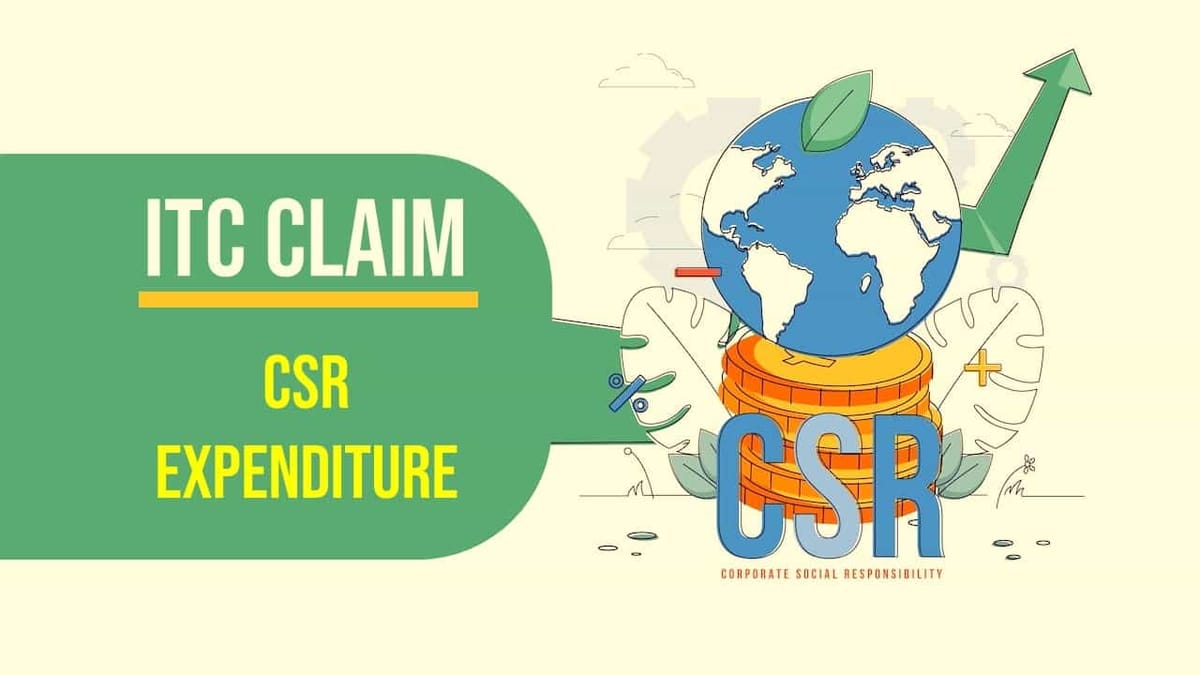Government is expected to change GST law through Finance Bill 2023, denying firms credit for taxes paid while acquiring goods and services for community as part of CSR.
Reetu | Jan 24, 2023 |

Budget 2023: Government may limit ITC Claim for CSR Expenditure in Upcoming Budget
The Government is expected to change the Goods and Services Tax (GST) law through the Finance Bill 2023 in the Upcoming Union Budget 2023, denying firms credit for taxes paid while acquiring goods and services for the community as part of their corporate social responsibility (CSR) requirements.
According to two people familiar with talks in the Central government, this means that the taxes that are part of the goods and services used in CSR efforts cannot be offset against the company’s overall GST payment. “This would be a significant alteration to the GST law,” one of the individuals stated. The proposal is to change parts of the GST Act (16 and 17) dealing with input tax credit, or ITC.
One of the pillars of GST is the availability of credit to businesses for taxes paid on purchases, so that tax only applies to value addition at each point of the supply chain and there is no tax on tax. Credit for GST paid while purchasing goods and services to meet CSR requirements, on the other hand, has been a hazy area, with different advance ruling agencies issuing contradicting rulings. According to the first person listed above, this has necessitated clearing the air through legislative revisions. Changes to different tax legislation, such as the Income Tax Act, Customs Act, CGST Act, and IGST Act, are enacted through the yearly Finance Bill.
The advance ruling authorities in Uttar Pradesh, Telangana, Gujarat, and Kerala have examined whether taxes paid as part of CSR activities are “in the course or furtherance of his business,” the criteria for credit to be available for taxes paid on purchases, and have reached diametrically opposed conclusions. While the Telangana State Authority for Advance Ruling and the Uttar Pradesh Authority for Advance Ruling stated that GST on inputs purchased for CSR is available as credit, the authorities in Gujarat and Kerala ordered otherwise, according to public domain orders.
The Telangana State Authority for Advance Ruling highlighted in its order dated October 20, 2022 that the CSR spending required by the Companies Act is an investment made to advance the enterprise. According to the judgement, “the tax paid on purchases made to comply with corporate social responsibility duties shall therefore be eligible for input tax credit under Central GST and State GST Acts.” The UP Authority clarified in its judgement from January 2020 that CSR spending is not optional; rather, it is a requirement under company law, and as a result, tax credit on it is not limited. The Gujarat Authority for Advance Ruling clarified in its order from August 2021 that CSR activities are not considered part of the normal course of business and are not consequently eligible for ITC.
For significant corporations like Reliance Industries, TCS, Tata Sons, HDFC Bank Ltd., and ONGC, which according to government data spend the most on CSR, the decision to make it clear under the CGST Act that input tax credits will not be available to enterprises for CSR is relevant. Reliance Industries spent the most on CSR in FY21 (Rs.922 crore), followed by TCS (Rs.674 crore) and Tata Sons (Rs.546 crore), while HDFC Bank Ltd. and ONGC Ltd. each spent Rs.534 crore and Rs.531 crore, respectively. More than Rs.25,700 crore was spent on CSR by India Inc. in FY21.
Over the past few years, industry spending on CSR has increased significantly from the over 14,300 crore invested in FY17. The government put into action a penalty clause for failing to meet CSR spending obligations in January 2021 and permitted companies to spend more than they were required to, which may be deducted from their required future spending.
A company must devote 2% of its average net profit over the previous three years to CSR initiatives if it has a net worth of at least 500 crore, a turnover of at least 1,000 crore, or a net profit of at least five crore. Regardless of whether they receive tax credits, businesses are required to spend the sum calculated in this way on CSR. Receiving an input tax credit has the benefit of allowing the business to use it to offset at least some of the GST owed on sales.
Emails sent on Friday seeking responses for the story to the GST Council Secretariat and the finance ministry’s spokeswoman went unanswered as of the time of publication.
In case of any Doubt regarding Membership you can mail us at [email protected]
Join Studycafe's WhatsApp Group or Telegram Channel for Latest Updates on Government Job, Sarkari Naukri, Private Jobs, Income Tax, GST, Companies Act, Judgements and CA, CS, ICWA, and MUCH MORE!"